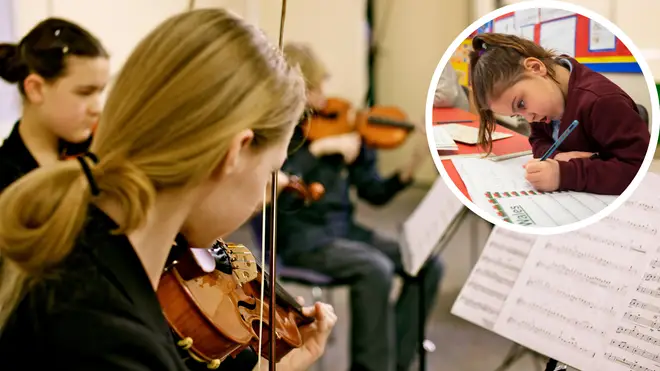On Air Now
Relaxing Evenings with Zeb Soanes 7pm - 10pm
5 October 2021, 13:34

With 18 months away from the classroom, teachers have seen a noticeable decrease in children’s fine motor skills. Music teachers suggest that they can offer a solution.
Think back to your own school music lessons, and you may recall the unmatched joy of getting to spend 30 minutes with a classroom keyboard – perhaps even being dared to press the infamous ‘demo’ button at inappropriate times during the lesson.
However, the last 18 months have looked very different for today’s schoolchildren.
With music lessons going from the hands-on dream of a year 7’s timetable, to just another lesson delivered on Zoom, it’s no wonder music teachers are so eager to get young people back to playing.
But there’s another reason these practical music lessons are so important.
Read more: ‘We want every child to get the chance to play a musical instrument’ – Sir Keir Starmer

Los Angeles Children’s Orchestra plays gymnastic ‘Eleanor Rigby’ on America’s Got Talent
With the majority of last year’s lessons delivered digitally, some schoolchildren are out of practice when it comes to skills like handwriting.
Good in-hand manipulation is a fine motor skill needed for handwriting. It’s the practice of picking up, moving and manipulating an object in your hand; in this case, a pen.
Like anything, without practice, skills can ultimately diminish over time, and teachers have noticed their new September intakes are significantly behind in this area.
In June 2021, the educational publisher Schofield & Sims conducted a survey of primary school teachers asking teachers whether the pandemic disruption had had a negative effect on pupils’ good writing habits.
83 percent of the respondents agreed with the statement, however over half reported that there had been no catch-up system put in place for the students who were now struggling with their fine motor skills.
The underdevelopment of fine motor skills in young people has also meant that muscle memory has been impacted.
Musicians will recognise this term as it’s a form of memory which is cemented in the brain by the repetition of a certain movement; a skill often used during music memorisation.
As well as music, it’s used for accurately scribing the size and position of letters in handwriting. The survey also noted that this was a particular issue with younger children in key stage 1 returning to class after the pandemic.
Fine-tuning motor skills has long been associated with learning a musical instrument.
A 2006 paper titled, ‘Does Music Instruction Improve Fine Motor Abilities?’ found a significant improvement in fine motor skills in children who received two years of piano lessons.
The article’s conclusion explains, “When performers practice their instruments, they receive immediate and consistent aural feedback about their motor response to such stimuli.
“The innumerable opportunities to assess, refine, and time their motor responses to specific stimuli during musical practice and the availability of constant evaluative feedback (i.e., sound) may allow musicians to improve the accuracy and speed of perceiving and responding to relevant stimuli.”
By fine-tuning motor skills, music lessons could act as the much needed catch-up for young people’s handwriting and muscle memory.
As pupils returned to the classroom at the start of this term, music teachers have reportedly been pushing towards lessons with a more practical focus – prioritising learning instruments like the keyboard, ukulele or recorder.
Now more than ever, music in schools is an integral part of the curriculum, and with the 2020 addition of Music Education Hubs, we hope to see this subject continue to be celebrated and put – as footballer Wilfried Zaha so wishes – at the heart of children’s lives.